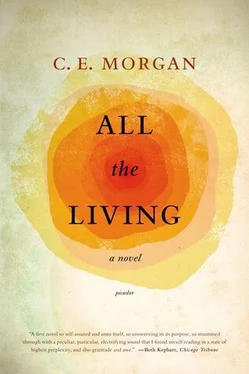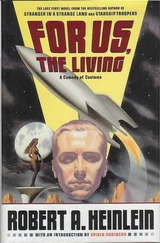When she left, she hummed the old modaling songs until she turned into the gravel drive, long after nightfall. The house and the fields were dark, but as Aloma stood quietly on the back steps peering into the depthless black, she could tell by the uninterrupted shadows that every last white blossom had been cut.
* * *
The next Sunday Bell Johnson preached on waking to creation. Aloma played hymns of her own choosing except for “Come My Soul, Thou Must Be Waking,” because he asked for it especially, saying it was a favorite and that it spoke better than he could to how it was to wake and pay right attention. She did not know what he meant by right attention, but when they sang on Sunday morning, she felt their singing was indeed a rendering of all their feeble strength could pay and she could see how even the efforts of the strongest men, the ones who were broad and young, even their strength was feeble against the backdrop of the whole earth. That could not be denied, or at least she thought so in the moment when her hands charged the hymn from the piano and her eyes passed continually from the page to Bell to the people singing. And again, she watched as Bell took up his stance at the lectern, wrapping his hands only momentarily around the pale wood before stepping away again, abandoning his post to stand almost among them in the pews. She noticed again the way he stopped to think while he preached, pausing to look out the window as if the light itself would revelate him. Then when he spoke again, renewed, he moved up and down on the landing as he felt led, pausing occasionally for a word, and the people stayed with him, they fanned themselves or shifted to ease their backs, but all in patience, all in waiting.
At the close of the service, when most of the congregants had wandered out to stand milling in the parking lot, Aloma trailed out of the church. She clutched a hymnal to her chest and as she passed Bell, who stood on the front steps, she waved goodbye. Though he was talking to his mother and another older woman, his eyes found hers and he kept her with a glance. And when he moved away from them, he said, Your playing is mighty fine, mighty fine. Everybody thinks so.
Thank you, she said and wanted to say more, something easy and generous, but was instead struck with the feeling she had whenever she was around him, that she could not find her normal speaking voice. It was not just because she was afraid he would find out she was living with Orren unmarried, but something more, some feeling that her tongue was a limp and useless thing before him. She felt herself almost shied by him. And because of this, she knew he found her nature sweeter than it was and more compliant, but as much as that was not the true state of her — her roughcut life had never afforded her the luxury of mildness — she found herself unable to change it. Or unwilling to try.
Miss Aloma, Bell said, we got a prayer meeting that gets together on Sunday afternoons that you might could be interested to attend. We’d like to see you there.
She thought about that for a second as his face was bent down earnestly toward hers so that she could see the risen color on his cheeks and even the pinhole pores there and she thought how Orren would roll his eyes at this, and that more than any real desire made her say, I don’t mind to, and Bell smiled, Good. But when she was home again, she was careful not to mention it, saying merely that she was needed at the church in the late afternoon. Orren only nodded, unconcerned, and she bristled silently at this. Some part of her wanted him to mind, wanted him to say, But I don’t hardly see you ever, which he might have said once, at least she imagined. Except that she couldn’t know that for certain, there had not been a once upon a time in the big house, only the time before the big house when they lived apart and came together in a way that was more collision than cohabitation. Everything else was conjecture. But Aloma took Orren’s indifference without comment and went back to the church in the late afternoon.
She found a small group of six, all relatively young, but still older than her, sitting on folding chairs in the space between the landing and the first pews. When she came hesitantly up the aisle, Bell sat up straight in his chair and said, Good to see you, Miss Aloma, and they turned to her, three men and two women, and she felt the faint burn of their appraisal as she approached. One of the men stood up and unfolded a chair that was leaning against the pew and he offered it to her. She took it, but set her chair just slightly out of the perfect circle of their chairs. Then Bell was speaking again as he had been before she arrived and she realized suddenly that she had not brought a Bible — not that she had one to bring — and she reached for one, stealthy as she could manage, that lay on the first pew. Bell’s eyes followed her, but he didn’t pause and she parted the book randomly, rested it open-faced on her lap.
It is the wait that eats at us, I think so too, he said, picking up again after the interruption. But I believe that’s what we’re called to do, to keep ourselves as something precious and wait. That don’t mean a prayer gets answered. We can’t know the workings of God. I think we leave that to faith, he said. Leave that to faith and a good conscience, and not be like them that have put away faith and made shipwreck. It’s written.
Aloma had no idea what he was talking about and she looked at the others around her and saw them nodding and she nodded too in a kind of unrealizing sympathy. One of the women saw her and smiled and then put her head down a bit, looked at her own white tennis shoes. The woman’s long hair, thin at the ends, hung below the metal seat of her chair. Bell smiled at Aloma and said, We’re talking about marriage.
Oh, what about it? she said, and then either because she simply realized of her own accord or she saw the halting looks on their faces, her heart sank and she saw it for the singles group that it was.
Waiting for marriage, what we do while choosing to grow in solitude, he said. That’s what we’re talking about.
Uh-huh, she said, yes, and she nodded and then could not help but turn and look at the front door far behind her. She longed suddenly like a house-bound dog to be on the other side of it. Then she forced herself to turn around again, blinked at her companions, and settled in to endure. Only the two women talked, the men mostly sat. Aloma sat motionless in her chair and felt the sun on her back, she flipped the frayed Bible ribbon from place to place. She herself said nothing, but watched them regain their voices once they grew accustomed to her presence. They spoke of their desire for some kind of matching that might be made for them, by God, or by chance, though they believed God. It made her think of Orren back at the farm and she wondered what he was doing while she sat here in this circle of strangers — their unselfconscious longing filling her with a deep unease, almost a spite — and where he was at this moment. She did not know, there was his innerness. It was his land, though he had said, This is ours now, that first day when she had arrived in her truck and saw the peeling house and the fields for the first time. She thought again of the day he had called her after the funeral and said, You’ll come down, and she had said, Yes, yes, without hesitating. It occurred to her now that she should have paused, it would have been wise to think it over, but any hesitation would have been a lie. She did not, could not hesitate. She went down. And now, with the sun on her back and a Bible on her lap, she did not know where he was and she barely knew where she was. She remembered the way he had been when she’d first known him, when he drove her out on the veering roads and they always ended up back at the settlement school and before the night was through, her shirt was ridden up around her neck and it felt like he was trying to push his way inside her without even bothering to take off her jeans. She remembered what it was to be furiously happy like that. She drew up the two halves of the Bible and let it fall open on her lap as happenstance guided it. She read the verse before her: Better to visit the house of mourning than the house of feasting, for to be mourned is the lot of every man and the living should take this to heart. She scowled at the verse, shifted hard in her seat, and snapped the book shut. It was not like one of her scores, she could never find in it what she needed.
Читать дальше
Конец ознакомительного отрывка
Купить книгу











